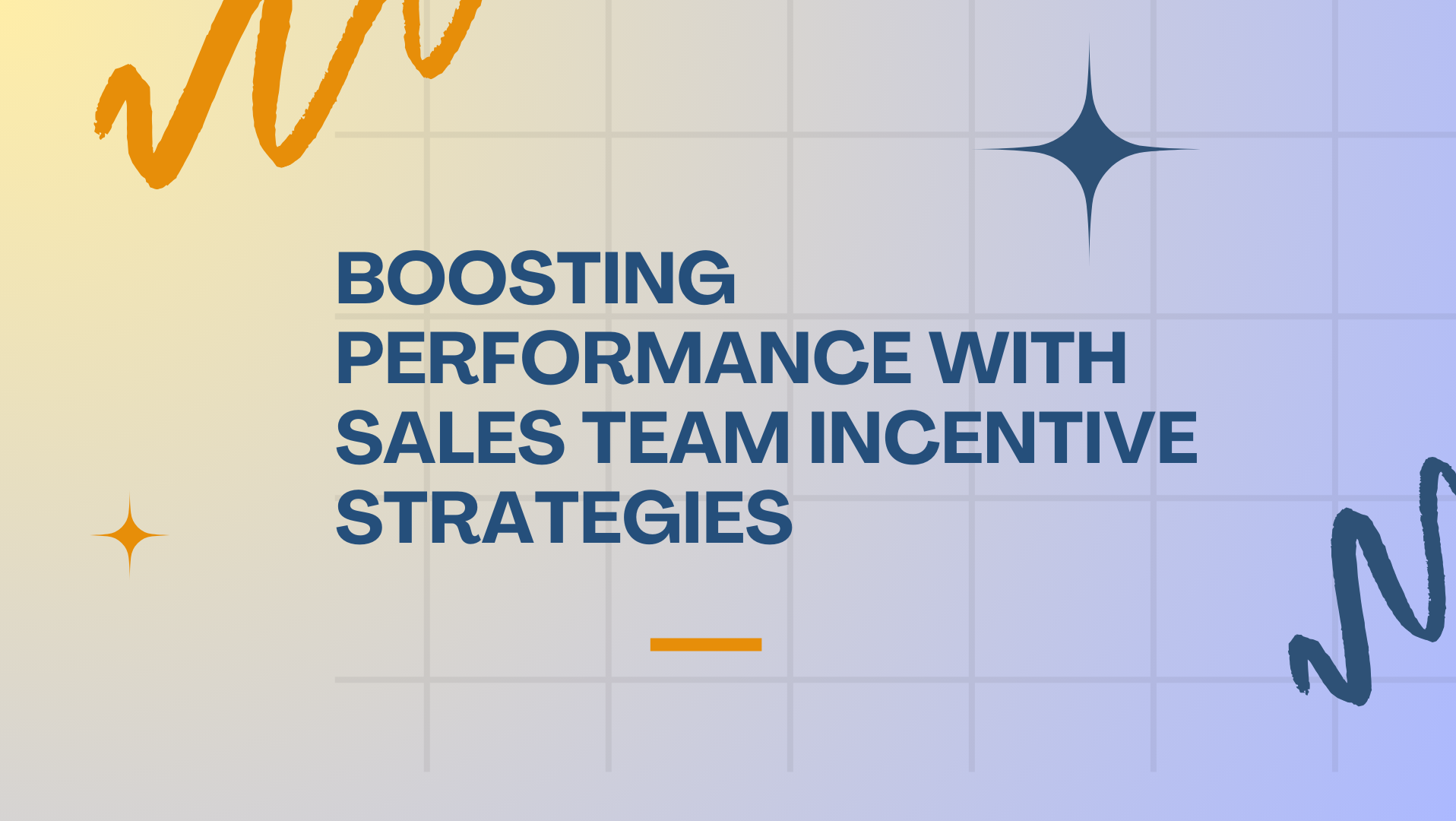Boosting Performance with Sales Team Incentive Strategies
Incentives are effective tools sales managers can use to drive performance in their teams. In fact, 90% of top-performing organisations use incentive schemes to motivate and reward their salespeople.
But why do incentives work so well? How can you implement an incentive programme that genuinely works for your team? In this article, with the help of MySalesCoach expert Steve Myers, we’ll show you.
This article is part of the Essential Guide To Effective Sales Leadership.
We'll cover:
- Understanding Motivational Drivers in Sales
- Assessing Individual Needs and Preferences
- Customising Incentives to Enhance Engagement
- Types of Incentives and Their Effects
- Monetary Incentives
- Non-Monetary Incentives
- Hybrid Incentives
- Psychological and Social Incentives
- Personal Acknowledgement and Praise
- Setting Clear and Achievable Objectives
- Aligning Incentives with Company Values and Goals
- Designing Transparent and Fair Incentive Structures
- Involving the Team in Incentive Program Development
- Methods for Measuring Incentive Programme Success
- Adapting Incentives to Changing Team Dynamics
Understanding Incentives and Sales Performance
Understanding Motivational Drivers in Sales
‘The universal truth of all sales teams, anywhere in the world, is that salespeople are people. People are hardwired in very similar ways. If you get sales incentives right, they will motivate people to do the behaviours you need in order to achieve the results you want.’ – Steve Myers
Assessing Individual Needs and Preferences
Understanding what motivates your salespeople on a granular level is the heart of the matter. The only way to do this is to sit down with them one-to-one and discuss it in a structured way. Employ coaching methods to help your people discover what motivates them.
If you're interesting in finding out more about sales team coaching techniques and strategies, we have a deep dive article here.
Customising Incentives to Enhance Engagement
The key to creating a successful incentive programme is ensuring the behaviours you’re incentivising align with your organisation’s overall objectives. If you don’t do this, it could do more harm than good.
‘If you’re rewarding people for booking appointments, they’ll be motivated to book appointments. But in many cases, what you end up with is a bunch of poorly-qualified appointments.’ – Steve Myers
Types of Incentives and Their Effects
Monetary Incentives
Cash Bonuses and Commissions
‘My belief is that cash bonuses have a very limited impact on behaviours and sales performance. It’s hard to get emotionally attached to numbers on a screen. People get emotionally attached to the things money provides them.’ - Steve Myers
Try to think more creatively than simply money when devising your incentive scheme. Tap into their personal desires and the true impact of performance.
Profit Sharing and Stock Options
Offering profit sharing or stop options can work well if the individual concerned is motivated that way. If they value long-term stability and have long-term goals, they can wait for stock options to deliver value and maintain performance through that period. Stock options also promote a sense of ownership, as you have skin in the game.
On the other hand, if the salesperson is very short-term focused and wants their reward now, stock options probably won’t have the desired effect.
Non-Monetary Incentives
Recognition Programmes
Recognising performance can be effective, but it all depends on the individual involved.
‘One man’s meat is another man’s poison. Bringing them up on stage in front of 1,200 people at the sales kick-off could be better than winning the lottery or the worst torture imaginable.’ – Steve Myers
Career Advancement Opportunities
Depending on what motivates the individual, using career promotion as an incentive can work well. This is because a promotion can help you achieve several goals:
- Intellectual – The challenges of mastering sales leader leadership
- Financial – The pay rise that comes with a promotion
- Emotional – Being able to better provide for your family
Hybrid Incentives
Combining Monetary and Non-Monetary Rewards
We have goals that require funding and goals that require time. You could have a goal of paying your mortgage off by 40. That’s a financial motivation. Or you could have a goal of doing an MBA, or an emotional goal like not working on Fridays.
‘Our goals are hybrid, so providing a hybrid of financial and non-financial incentives that meets all those goals could be everybody’s perfect idea.’ – Steve Myers
Customised Incentive Packages
Whatever incentive package you choose, it’s much more likely to be effective if you tailor it to the individual salespeople, tapping into their personalities and goals. Take time to learn what motivates your people to maintain high performance, even when the obstacles feel too challenging to navigate. Work out the behaviours you want to see and the outcomes you want to create, then design an incentive programme to match.
Psychological and Social Incentives
Team-Based Rewards and Competitions
‘Nobody likes being responsible for things they can’t control. So, I don’t want my incentive package to be affected by somebody else’s performance. In my experience, team-based incentives do more damage than good.’ – Steve Myers
Salespeople are not always great team players, and if 20% of your salespeople are generating 80% of the revenue, team-based rewards can be a recipe for disaster. Friendly competition can work with the right types of personalities, but it’s best avoided.
Personal Acknowledgement and Praise
Know your audience. While some people love to be the star of the show, for others, being praised in front of a group can be their worst nightmare.
Remember, you can’t externally motivate anyone. All you can do is figure out what motivates them – and deliver it.
Key Elements of Successful Sales Team Incentive Programmes
Setting Clear and Achievable Objectives
‘One thing that’s really important is making sure the goal is actually attainable. If you set thresholds too high, your people won’t get what they need.’ - Steve Myers
As well as making sure targets are achievable, don’t penalise people in the future for success today by raising their targets without raising their OTE. Salespeople are savvy. If they see you doing this, they’ll leave.
If you're interested in finding out more about sales team collaboration and communication, we have an article here.
Aligning Incentives with Company Values and Goals
You have to pay people to do the right thing. But what the right thing actually is? That’s up to you.
When you’re dealing with people, you’ll always get the behaviours you drive, so you have to make sure you’re driving the right behaviours.
As mentioned earlier, if you incentivise booking meetings, your people will book a load of meetings without caring about the quality of those prospects. In effect, you end up wasting people’s time.
If you're interested in finding out more about remote sales leadership, we have a deep dive article here.
Designing Transparent and Fair Incentive Structures
It’s optimal to share what everyone’s getting via the incentive scheme, but your salespeople will focus on themselves.
‘If I’m getting what I need, I don’t really care what you’re getting.’ - Steve Myers
People are different, and their incentives should be different. However, if everyone’s happy, everyone will understand the reasons for the variations.
Involving the Team in Incentive Program Development
Getting your people involved in formulating your incentive programme is absolutely necessary. However, do it on an individual level. Don’t make it a team thing.
Once you figure out what they want, show them how to get there.
Evaluating and Adjusting Incentive Programmes
Methods for Measuring Incentive Programme Success
’I have a very simplistic view of this. It’s measured by the performance of your salespeople and the retention of good talent.’ - Steve Myers
Measuring effectiveness doesn’t have to be complex. You’re incentivising performance, so measure that. And if they stay with your organisation, it’s because they’re fulfilled with you. It’s a win-win.
Adapting Incentives to Changing Team Dynamics
You should update your incentive programme every year to ensure you’re on the right track. However, be careful not to change the rules in the middle of the game, as it can be massively destabilising.
Conclusion
Crafting a successful incentive scheme doesn’t have to be rocket science. Work out the behaviours you want to drive, understand what motivates your individual salespeople, then tie the two together.
Make sure the targets are achievable and totally within the salesperson's control. Transparency within the team is also optimal. However, you’re dealing with individuals at the end of the day. Look after your people, and they’ll look after you.
Find out more from MySalesCoach
At MySalesCoach, we help busy sales managers and ambitious reps reach their potential with expert, consistent 1:1 coaching.
To find out more about MySalesCoach, book a call with us today.





Leave Comment